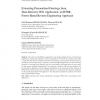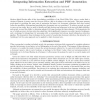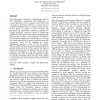133 search results - page 4 / 27 » Partial Information Extraction Approach to Lightweight Integ... |
INFORMATICALT
2007
13 years 5 months ago
2007
The advance of the Web has significantly and rapidly changed the way of information organization, sharing and distribution. The next generation of the web, the semantic web, seeks...
DRR
2009
13 years 3 months ago
2009
Modern digital libraries offer all the hyperlinking possibilities of the World Wide Web: when a reader finds a citation of interest, in many cases she can now click on a link to b...
WWW
2009
ACM
14 years 6 months ago
2009
ACM
In this paper we present Triplify ? a simplistic but effective approach to publish Linked Data from relational databases. Triplify is based on mapping HTTP-URI requests onto relat...
ADBIS
2003
Springer
13 years 11 months ago
2003
Springer
The Web has become the world’s largest information source. Unfortunately, the main success factor of the Web, the inherent principle of distribution and autonomy of the participa...
ADC
2006
Springer
13 years 11 months ago
2006
Springer
Web information extraction is a fundamental issue for web information management and integrations. A common approach is to use wrappers to extract data from web pages or documents...



